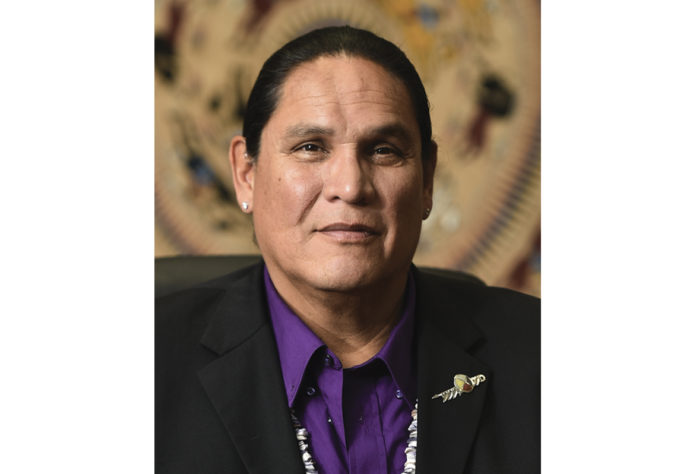by Ernest L. Stevens, Jr.
Over the past year, Native Nations suffered unthinkable loss while making crucial sacrifices to protect our communities. Like those who came before us, we are persevering and emerging resilient. But we have much work ahead to build an even stronger Indian Country for the generations to come.
While the COVID-19 pandemic spared no one, it disparately impacted Native Nations from both a health care and economic perspective. In March of 2020, tribal governments took immediate action to prevent transmission of the virus and to protect the safety of employees, guests, and our communities. Knowing that prior pandemics inflicted death and trauma on Native communities at rates four times the national average, tribal leaders nationwide closed enterprise operations and issued lockdown orders in early March to help stop the spread of the coronavirus.
In these early days of the pandemic, the National Indian Gaming Association immediately united with our member tribes and sister tribal organizations to help Indian Country meet this unprecedented challenge. In late March of 2020, we worked with federal policymakers to secure $8 billion in direct funding to tribal governments through the CARES Act to help blunt the economic devastation caused by the pandemic.
While the CARES Act helped provide a bridge to keep Indian Country moving, the U.S. suffered the steepest surges of infections and deaths through the winter of 2020-21. The National Indian Gaming Association never slowed in our outreach. We consistently urged Congress to enact a COVID-19 relief package that included $20 billion for tribal governments to build on the CARES Act that was more flexible and better respected the local decision-making of tribal leaders.
The November 2020 elections brought significant changes in leadership to Washington, D.C. Our association worked seamlessly with the incoming Biden Administration and congressional leaders to deliver more than $31 billion through the American Rescue Plan (ARP) for Indian Country.
The ARP delivered the economic relief Indian Country needed in the form of $20 billion in fiscal recovery funds that are going directly to tribal governments. The plan also provides significant resources to the Indian health care system, tribal housing, education, language preservation and other critical services. Set asides were included throughout the American Rescue Plan to provide direct funding to tribal governments on par with state and territorial governments.
Possibly the most important aid to helping Indian Country begin to emerge was the Biden Administration’s work with tribal leaders to distribute vital vaccines throughout Indian Country. Thanks to this work, we are carefully opening our communities. However, as noted above, much work lies ahead to ensure this devastation is not revisited. We must continue our work to build even more resilient communities.
To accomplish this goal, the National Indian Gaming Association is again uniting with our member tribes and sister tribal organizations in working with the Biden Administration and Congress as they develop legislation to revitalize America’s infrastructure.
Indian Country’s infrastructure backlog is estimated to stand at more than $50 billion, covering the entire range of basic structures and systems. The COVID-19 pandemic laid bare the infrastructure shortfalls throughout Indian Country.
Overcrowded homes, substandard health systems and facilities, and broken water systems all contributed to spreading the virus in Native communities. As schools closed, the lack of broadband made it impossible for many students to engage in remote learning.
Any infrastructure proposal must include direct federal funding to address these significant unmet infrastructure needs. In addition to helping address these immediate needs, investing in Indian Country’s infrastructure will work to spur short-term job growth through construction, foster long-term economic development by opening doors for Native entrepreneurs, and stabilize and diversify tribal economies for generations to come.
These direct federal investments must be coupled with long-needed changes to the tax code. While the tax code provides state, local, and territorial governments with preferred access to capital and tax credits that help them finance infrastructure projects, these same tools are not directly available to tribal governments. These omissions suffocate tribal economies, feed into high unemployment rates, and limit opportunity on Indian lands.
The most glaring examples of the tax code’s failure to respect Indian tribes as governments are found in the federal Low Income Housing Tax Credit program (LIHTC), the New Markets Tax Credits, and Tax Exempt Bonding authority. Securing legislative fixes to respect the governmental status of Indian tribes will help establish and strengthen tribal government-private sector partnerships and access to capital.
Congress has struggled for more than a decade to deliver for the American people on an infrastructure package. However, we must continue our work in Washington, D.C. to meet this historic moment. The coronavirus pandemic has taken so much from so many. But it also showed us what is possible when Indian Country unites behind the common purpose of working together to build a better place for all generations to come.
My continued prayers go out to hundreds of thousands of American families who lost loved ones over the past year. We pray for a safe journey for those who have walked on, for the continued safety of our frontline workers, and for the continued health and safety for our tribal communities.
Ernest L. Stevens, Jr. is Chairman of the National Indian Gaming Association. He can be reached by calling (202) 546-7711 or visit www.indiangaming.org.














































